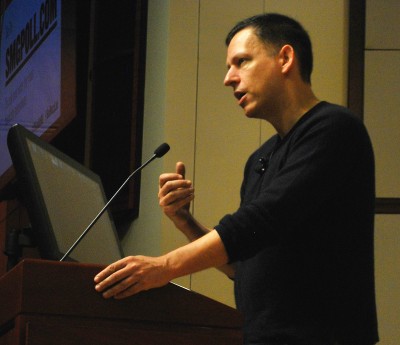Competitive markets are not the best fodder for innovation. Pursuing higher education is a deterministic concept that has been engrained into students’ minds. Those are just some of the unusual ideas from Peter Thiel, co-founder of PayPal and billionaire investor.

On Tuesday, Boston University hosted Thiel as a speaker at the School of Management auditorium to talk about his new book “Zero to One: Notes on Startups, or How to Build the Future,” which he coauthored with Blake Masters. The event — organized by BU’s center for entrepreneurship, The BUzz Lab — was sold out in 48 hours, selling approximately 380 tickets, said Ian Mashiter, director of The BUzz Lab and lecturer at SMG.
Scott Kirsner, The Boston Globe’s “Innovation Economy” columnist and BU alumnus, was the moderator.
One of the central themes of Thiel’s book is that competition does not spur innovation, contrary to what many think. Rather, it incites homogeneity. He contends that enterprising companies should aim for monopoly.
“Most people think that capitalism and competition are synonyms. They are antonyms,” Thiel told the crowd. “What you always want to be aiming for is a monopoly. You want to be building something no one else is building. The paradigm of a successful company is Google.”
Masters said the notion that competition is good is something that has been deeply embedded in capitalistic traditions.
“When Americans talk about competition, we automatically, unquestionably think it’s good and equate that to a market system. But actually, when you think about really competitive industries — the classic Economics 101 model — a perfectly competitive economy is one where each firm makes little profit,” he said in an interview with The Daily Free Press. “It’s a world where there’s no differentiation between people, companies [and] products in the market. Everything good, everything unique, is monopolistic.”
The book’s beginning stems from CS 183: Startup, a class Masters took at Stanford University taught by Thiel.
“It was basically everything he knew about startups. He went to Stanford himself, went to Stanford Law School and had this really storied career both as an entrepreneur and investor in Silicon Valley,” Masters said. “It didn’t take too long for the class to get oversubscribed. It must have had 200 or 300 students in the audience.”
In each class, Thiel would focus on a different topic, Masters said.
“What was cool about the class, and sort of the book which is based on it, [is that] it’s this really interesting mixture of really practical advice, best practices, mixed with high-level analytics and business philosophy,” he said.
The notes Masters took on that class became the foundation for “Zero to One.”
“And then I took the notes in class and, to my knowledge, no one else took notes and posted them online,” he said. “So that was the unique thing I guess.”
Masters said the book’s title has mathematical origins.
“‘Zero to one’ means doing something new — going from nothing and creating something that didn’t exist before. And we contrast it with the model ‘1 to n,’ [which is] taking something that exists, duplicating it, recreating it,” he said. “Zero to one is about bold innovation, not making incremental advancements.”
Despite being highly educated, Thiel has a foundation in his namesake that grants students money to spend time developing their companies, incentivizing them to leave school.
“There’s a tremendous interest in entrepreneurship and innovation,” Thiel said during his talk. “There is a sense that this is important for the country. I would say that from my way of thinking, there is a sense that people are too fixated on processes and systematic formulas.”
Masters said societal expectations play a significant part in leading students to choose college or university over a career after high school.
“There’s a lot of skills that people have that they don’t learn from colleges or universities,” he said. “You can’t major at plumbing at Harvard [University], yet there’s absolutely nothing wrong with being a plumber. In fact, you can make $100,000 as a plumber in San Francisco. When you say you have to go to college to ‘learn how to learn,’ it’s too vague for me.
“There’s a notion that you won’t have any future at all if you don’t go to college, so as a result, in high school, everyone is automatically thinking, or not thinking, they are automatically okay with debt. Our only saying is to think about it, because it’s getting more and more expensive every year.”
At BU, The BUzz Lab is providing opportunities for students interested in entrepreneurship to pursue their passions, Mashiter said.
“We’ve being doing various entrepreneurship programs for several years. But we felt, in order to really take it to the next level, we needed a physical home. And it wasn’t just the faculty who felt that,” he said to the FreeP. “Both students and faculty thought dedicated space was important.”
Mashiter said The BUzz Lab hopes to cast a wide net, encouraging undergraduates, graduate students, alumni and students from various clubs to use the space.
“We want to be inclusive of any club that has some crossover with entrepreneurship. So whether it is Global App Initiative or Net Impact or Guerilla Marketing Society, any of those clubs are welcome to use our space for meetings,” he said. “The message is we want to be inclusive, not exclusive.”
After Thiel’s speech, several audience members left with questions.
“The question that was asked about … him [Thiel] and his cofounders being immigrants was pretty impactful,” said Sean Chung, chief technology officer for Wellapets, a company that develops health-centered children’s games founded by BU alumna Nikita Virani. “[Can] everyone become an entrepreneur or does it take a set of new perspectives?”
Overall, Chung said the most important part of the talk was Thiel’s challenge to conventions.
“Just because that’s how it’s been done doesn’t mean it’s the right way to do something,” he said. “I feel like sometimes you have to go against the grain to innovate and come [out] ahead.”
Erwin Wang, a junior in the College of Arts and Sciences and founder of an events promotion company, echoed Chung’s sentiments.
“I liked the point he [Thiel] made at the end about the Catholic Church reformation thing, where everyone feels like they have to go through a conventional path,” she said. “I feel like that’s how society progresses, challenging the status quo.”














